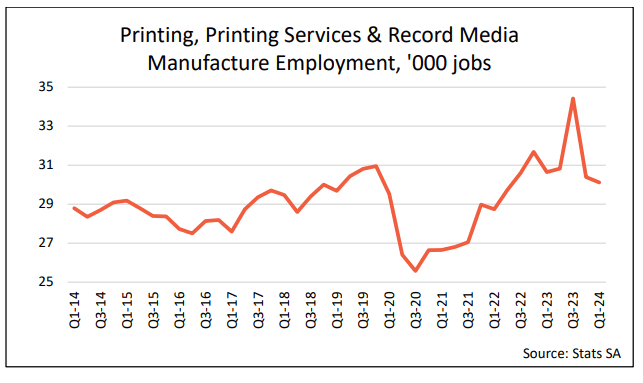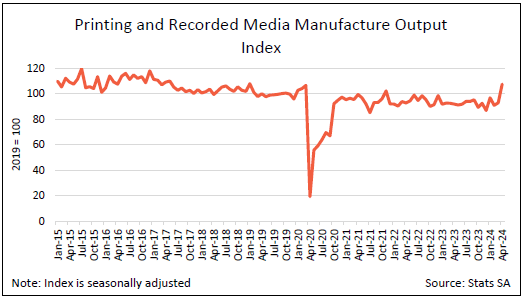The Impact of Personalised Digital Printing in South Africa
There is debate as to whether the industry is dying or being reinvented. Indeed, the product lifecycle of the printing industry is, in marketing parlance, in the extension phase. Transformation and technological innovation have seen the printing industry adapt from papyrus to Gutenberg, letterpress, lithography and digital. The WOW report on the printing industry in South Africa provides insights that address the question.
Employment in the printing industry

The decline of high-volume newspaper and magazine printing is well known. Recently, a few local newspapers were reported to be losing their print editions or closing, and the consequential losses of jobs are not negligible.
Printing SA says that the industry employs 40,000 people directly and a further 60,000 indirectly. Paper manufacturers are reducing newspaper and standard A4 paper to produce more profitable paper packaging material and cellulose for the textile industry.
This is in line with the stance of Joseph Schumpeter, an influential economist who made significant contributions in the fields of economic development and technological change. He argued that innovation in the form of new products, technologies or business models disrupts existing markets, leads to the demise of older industries, and affirms the way of the world. He called this creative destruction.
Digital printing is progressively taking over from traditional printing and has created quite a few job opportunities.
The WOW report makes it clear that printing is not just newspapers, magazines and books.
The role of digital printing in enabling customisation
Printing of pamphlets, brochures, catalogues, labels, signage and posters; screen printing on garments and textiles; and printing on packaging materials such as corrugated containers, folding cartons, paper sacks, plastic bags, milk and beverage cartons, disposable cups and containers, labels, adhesive tapes, envelopes, confectionery, food wrappers, plastics, metal and glass is better customised in a cost-effective manner through digital printing.
Digital printing enables brands to create customised packaging designs for different product variations, markets and individual customers.
Printing will continue to exist in ever-changing formats, as it remains a quintessential part of business and marketing, communication and information distribution channels.
The structural shift in the South African printing industry is from big companies producing high volumes to SMEs making up the majority of the 1,600 printing companies.
The benefit of digital printing to SMEs

New technologies facilitate small volume printing for specific purposes at a lower cost. These opportunities are driven by changing demands. These niche market areas offer opportunities to SMEs by lowering the cost of entry to the industry, as the cost of new digital technologies is cheaper than high volume and large format printing using expensive equipment.
The longer term contraction of the printing industry was exacerbated by the COVID lockdown as illustrated. This forced players in the sector to find innovative ways to respond to economic conditions, including low growth, high interest rates, and shrinking disposable income. It has to be noted that the industry has done well in managing costs to stay competitive.
It is worth debating which is more important: cost leadership and/or diversification. Market conditions and customisation of products hold a clue to the answer.
Contact us to access WOW's quality research on African industries and business
Contact UsRelated Articles
BlogCountries ManufacturingSouth Africa
The Flour and Grain milling industry – from field to table
Contents [hide] The flour and grain mill products manufacturing industry is crucial to the South African economy and livelihoods. Staple foods like maize and wheat are essentially a commodity. They...
BlogCountries ManufacturingSouth Africa
FMCG in the era of sustainability: South Africa’s story
Contents [hide] The drivers of FMCG in South Africa As explained in the WOW report on fast moving consumer goods (FMCG) trends in South Africa, FMCG covers all the things...
BlogCountries ManufacturingSouth Africa
The Evolution of South Africa’s Cosmetics Industry: Past Growth and Future Opportunities
Contents [hide] South Africa’s cosmetics industry has grown significantly over the past few decades and evolved from a market once dominated by international brands into a vibrant sector with dynamic local...





